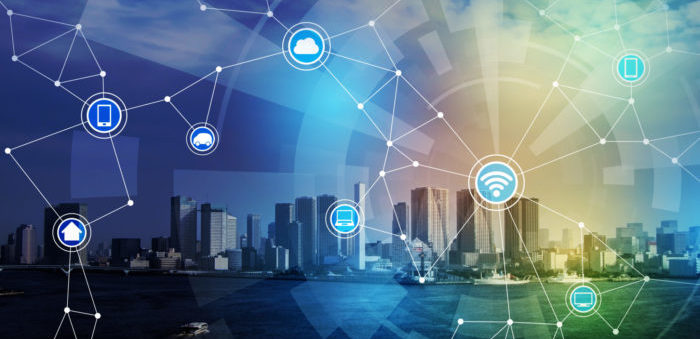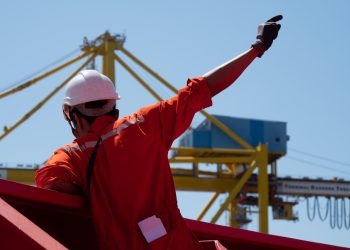Adm. (USCG Ret) Thad William Allen notes that we are living in a digital age and therefore industry needs to tackle with new and emerging issues. Earlier this year leaders from the Hellenic and American shipping communities came together in Athens to discuss current issues and exchange views to promote safer, smarter, greener, optimized, innovative, and sustainable shipping.
The Hellenic American Maritime Forum included inaugural awards. I was honored to receive the Forum’s Lifetime Achievement Award sponsored by the American P&I Club. The opportunity to engage this extraordinary group of maritime professionals prompted me to reflect on the everchanging global environment and the future of international maritime transportation systems.
Discussions regarding the outcome of BREXIT, global immigration pressures, populist movements, and trade issues dominate the news cycle. Similarly, increased tension in the Straits of Hormuz driven by the seizure of vessels ostensibly engaged in innocent passage is of great concern. Supply chains are being stressed and challenged by the rapid advance of technology and competition for markets as witnessed by international competition in the 5G telecommunications markets. In some cases, supply chains are being developed locally or regionally through 3D printing or “additive manufacturing.” At the same time the need to move bulk cargoes from source to use remains a global system. Finally, the merging of information technology (IT) and operational technology (OT) networks has created a broad and complex attack surface for cyber threats. Those threats are exacerbated by the vulnerability of global navigation satellite system (GNSS) receivers such as GPS, Galileo, GLONASS, and BeiDou – not only cyber threats, but jamming, spoofing, and interference of navigation signals. Sorting how these trends and forces combine to affect the global maritime transportation system is a growing challenge for C-Suites, insurers and underwriters, cargo owners, ship owners, and manufacturers and their supply chains.
These are in fact conditions created by human beings and organized by nation state, markets, populist groups, political affiliation, holders of intellectual/property rights and so forth. However, there are risks to human endeavor that do not recognize international boundaries, legal structures, or governing structures. They include weather, biological threats, space weather, climate change, sea level rise, and the electromagnetic spectrum … spectrum that enables terrestrial and space-based telecommunications and a host of other capabilities.
In my mind, the relentless march of technology, capital markets that seek lowest costs and highest returns, natural conditions and phenomenon that are agnostic to political boundaries, and an unequal distribution of population and sources of water, food, and energy will ultimately become the major driver of global trends, including maritime transportation. Short term actions by nation states however well-intentioned cannot in and of themselves affect the long arc of globalization. They can however exacerbate inequality and create regional and global conflict. The major, long term drivers of change in the maritime environment have been the collective wisdom of the family of nations to organize, govern, and operate across multiple jurisdictions.
To that end, we may rail at the slow pace in international regulation but in fact instruments like the Safety of Life at Sea (SOLAS) Treaty, the International Convention for the Prevention of Pollution from Ships (MARPOL), the International Ship and Port Facility Security Code (ISPS), together with the legal doctrine of Port State Control have created a predictable governing structure. It is far from perfect and it is lamentable the United States has not acceded to the United Nations Convention on the Law of the Sea (UNCLOS), a treaty the US promoted. However, these structures survive the individual actions of nations, trade wars, attempts to thwart freedom of navigation, or attempts to avoid transparent maritime operations. Withdrawal of the US from the Paris Agreement within the United Nations Framework Convention on Climate Change has drawn extensive coverage, and rightfully so. It was a shortsighted and naïve attempt to demonstrate sovereignty over a phenomenon agnostic to borders and politics. Concurrently, under International Maritime Organization (IMO) rules that come into effect in 2020, ships will have to use fuel with a maximum 0.5% sulphur content, down from 3.5% now, unless they are equipped with so-called scrubbers to remove the sulphur from the vessel’s emissions. Regardless of your view of this rule, it was consensus based and ratified internationally. The US cannot credibly invoke port state controls, inspect foreign ports under ISPS, or prosecute MARPOL violations and then fail to comply with an international climate agreement on sulphur emissions.
The best way to promote safer, smarter, greener, optimized, innovative, and sustainable shipping is through incentives to reduce risk and the associated costs
The broader issue in maritime transportation is governance. Arthur C. Clarke, author of Space Odyssey 2001 once remarked, “How inappropriate to call this planet Earth when it is quite clearly Ocean.” With 75 percent of the Earth’s surface covered by water, the strategic context and the future of marine transportation is ocean governance. Unlike the land mass of this planet that has been divided between nations (with the exception of Antarctica), the oceans are governed by bands of jurisdiction and contain the last global commons. Again, those jurisdictions only establish authorities to act against human created risks but not those agnostic to political borders. The best way to promote safer, smarter, greener, optimized, innovative, and sustainable shipping is through international consensus-based governance and market based incentives to reduce risk and the associated costs. To the extent the private sector and governments understand the linkage between ocean governance, markets and their self-interests, the process of assessing and mitigating human and natural risks could move more quickly. So, while anti-globalization, populist, or national movements recoil and react to perceived threats to their narrow interests, the inexorable movement toward global ocean governance will continue and markets will do what markets do.
With 75 percent of the Earth’s surface covered by water, the strategic context and the future of marine transportation is ocean governance.
I am not an engineer. I would have been better prepared for my eventual course in life had I elected to be one. I am familiar with the Law of the Conservation of Mass Energy. It was first espoused by Antoine Lavoisier in 1785, well before steam power, fossil fuels, and the industrial revolution in the phrase “matter is neither created nor destroyed.” Carbon has taught us that. Later in 1842, Julius Robert Mayer extended the concept to “energy is neither created or destroyed.” Carbon has taught us that as well. Einstein in 1902 merged both noting “the total amount of mass and energy in the universe is constant.” So, in our journey forward it is a zero-sum game regarding the environment and what it contains. The earth will remain, as will energy and mass; there is no requirement that it be resident in a life form. That is our choice.
The views presented hereabove are only those of the author and not necessarily those of SAFETY4SEA and are for information sharing and discussion purposes only.
ADM Thad Allen, USCG retired, 23rd Commandant, US Coast Guard
 Thad William Allen is a former United States Coast Guard admiral who served as the 23rd Commandant of the Coast Guard. Allen is best known for his performance directing the federal response to Hurricanes Katrina and Rita in the Gulf Coast region from September 2005 to January 2006, and for his role as National Incident Commander of the Unified Command for the Deepwater Horizon oil spill in the Gulf of Mexico in 2010.
Thad William Allen is a former United States Coast Guard admiral who served as the 23rd Commandant of the Coast Guard. Allen is best known for his performance directing the federal response to Hurricanes Katrina and Rita in the Gulf Coast region from September 2005 to January 2006, and for his role as National Incident Commander of the Unified Command for the Deepwater Horizon oil spill in the Gulf of Mexico in 2010.
In his four decades of service, Allen has held operational command both at sea and ashore, conducting missions to support the maritime safety, security and environmental stewardship interests of the nation.































































